[2011] 1 SLR 517 - Holland Leedon Pte Ltd - Singapore Law
[2011] 1 SLR 517 - Holland Leedon Pte Ltd - Singapore Law
[2011] 1 SLR 517 - Holland Leedon Pte Ltd - Singapore Law
Create successful ePaper yourself
Turn your PDF publications into a flip-book with our unique Google optimized e-Paper software.
[<strong>2011</strong>] 1 <strong>SLR</strong> SINGAPORE LAW REPORTS <strong>517</strong><br />
<strong>Holland</strong> <strong>Leedon</strong> <strong>Pte</strong> <strong>Ltd</strong> (in liquidation)<br />
v<br />
Metalform Asia <strong>Pte</strong> <strong>Ltd</strong><br />
[2010] SGHC 280<br />
High Court — Originating Summons No 1679 of 2007<br />
Philip Pillai J<br />
26 July; 17 September 2010<br />
Arbitration — Award — Recourse against award — Appeal under Arbitration Act<br />
(Cap 10, 2002 Rev Ed) s 49 — Leave to appeal — Whether appellate jurisdiction<br />
excluded by provision that award was “final and binding” — Whether appellate<br />
jurisdiction excluded by provision to exclude any right “in connection with questions<br />
of law arising in the course of any arbitration” — Whether arbitrator’s determination<br />
relating to commonly used mechanism for pricing businesses and shares open to<br />
serious doubt — Whether same issue was of general public importance — Whether<br />
plaintiff failed to identify question of law to be determined on appeal<br />
Facts<br />
The plaintiff and defendant entered into an agreement for the sale and purchase<br />
of the plaintiff’s business (“the SPA”). The consideration was computed by<br />
applying a multiplier to the plaintiff’s earnings before interest, depreciation, tax<br />
and amortisation (EBIDTA). The EBIDTA was derived from completed<br />
accounts jointly prepared by the accountants of both parties. The plaintiff was<br />
alleged to have breached certain warranties in the SPA. The defendant argued<br />
that those breaches had the effect of lowering the plaintiff’s EBIDTA and<br />
therefore the consideration under the SPA. On this basis, the defendant sought<br />
to claim the diminution in the purchase price had the allegedly lower EBIDTA<br />
been used to compute the consideration. The arbitrator made a summary<br />
determination that the defendant could proceed on this basis. The plaintiff<br />
appealed pursuant to s 49 of the Arbitration Act (Cap 10, 2002 Rev Ed) (“the<br />
Act”).<br />
The defendant relied on several clauses of the SPA to argue that the appellate<br />
jurisdiction of the court had been excluded. Clause 21.6 provided that the<br />
decision of the arbitral tribunal shall be “final and binding”. Clause 21.7 stated<br />
that: “The parties agree to exclude any right or application to any court or<br />
tribunal of competent jurisdiction in connection with questions of law arising in<br />
the course of any arbitration.” The defendant also argued that the plaintiff had<br />
not identified or formulated any question of law arising from the arbitrator’s<br />
decision, thus failing to satisfy s 49(6) of the Act.<br />
Held, granting leave to appeal to the court:<br />
(1) The exclusion of the right of appeal had to be effected through something<br />
more than a provision which merely provided for the binding effect of the<br />
arbitral award. Reading cl 21.6 as a whole, its overall effect was merely to provide<br />
for the binding effect of the arbitral award: at [5].
518 SINGAPORE LAW REPORTS [<strong>2011</strong>] 1 <strong>SLR</strong><br />
(2) The Act drew a distinction between a party’s right to apply to court to<br />
“determine any question of law arising in the course of the proceedings”,<br />
contained in s 45(1) of the Act, and a party’s right to appeal to court “on a<br />
question of law arising out of an award made in the proceedings”, contained in<br />
s 49(1). The language of cl 21.7 was referable only to s 45(1) and was insufficient<br />
to exclude the right of appeal in s 49(1): at [6].<br />
(3) In the arbitration, the defendant did not challenge the EBIDTA agreed to<br />
by the parties, and indeed it could not have done so as there were no warranties<br />
as to the EBIDTA, nor fraud or patent error in the completion accounts. In these<br />
circumstances, if the defendant’s claim was allowed to proceed, it would have the<br />
effect of subverting a commonly used mechanism for determining the purchase<br />
price in acquisitions of businesses and shares. Therefore, the arbitrator’s<br />
decision that the plaintiff was allowed to pursue his claim as described was at<br />
least open to serious doubt. Further, the issue related to a commonly used<br />
commercial pricing mechanism and was of general public importance.<br />
Section 49(5)(c)(ii) was therefore satisfied: at [9].<br />
(4) It was doubtful that s 49(6) of the Act was a condition precedent to the<br />
grant of leave (as opposed to a mere procedural requirement), since it was not<br />
placed in s 49(5). In any case, the plaintiff was clearly disputing the effect of a<br />
contractual term, and it was beyond controversy that the true construction of<br />
contractual terms was a question of law: at [11].<br />
Case(s) referred to<br />
Essex County Council v Premier Recycling <strong>Ltd</strong> [2006] EWHC 3594 (folld)<br />
Metalform Asia <strong>Pte</strong> <strong>Ltd</strong> v Ser Kim Koi [2009] 1 <strong>SLR</strong>(R) 369; [2009] 1 <strong>SLR</strong> 369<br />
(refd)<br />
Permasteelisa Pacific Holdings <strong>Ltd</strong> v Hyundai Engineering & Construction Co <strong>Ltd</strong><br />
[2005] 2 <strong>SLR</strong>(R) 270; [2005] 2 <strong>SLR</strong> 270 (folld)<br />
Legislation referred to<br />
Arbitration Act (Cap 10, 2002 Rev Ed) ss 45(1), 49(1), 49(2), 49(5), 49(6)<br />
(consd);<br />
ss 45, 49, 49(5)(a), 49(5)(b), 49(5)(c), 49(5)(c)(ii)<br />
Sundaresh Menon SC, Sim Kwan Kiat and Farrah Salam (Rajah & Tann LLP) for<br />
the plaintiff;<br />
Chelva Rajah SC, Chew Kei-Jin and Moiz Haider Sithawalla (Tan Rajah & Cheah)<br />
for the defendant.<br />
17 September 2010 Judgment reserved.<br />
Philip Pillai J:<br />
1 This is the plaintiff’s application for leave to appeal against a summary<br />
determination of issues (“the Decision”) by the sole arbitrator in the<br />
arbitration between the parties in SIAC Arbitration No 069/DA17/05 (“the<br />
Arbitration”). The plaintiff, <strong>Holland</strong> <strong>Leedon</strong> (“the Vendor”), is the<br />
respondent in the Arbitration, while the defendant, Metalform Asia <strong>Pte</strong> <strong>Ltd</strong>
[<strong>2011</strong>] 1 <strong>SLR</strong> <strong>Holland</strong> <strong>Leedon</strong> <strong>Pte</strong> <strong>Ltd</strong> v Metalform Asia <strong>Pte</strong> <strong>Ltd</strong> 519<br />
(“the Purchaser”). The dispute between the parties relate to the<br />
interpretation of terms in an agreement between the parties for the sale and<br />
purchase of the Vendor’s business (“the SPA”).<br />
Arbitration Act<br />
2 The relevant statutory provision is s 49 of the Arbitration Act<br />
(Cap 10, 2002 Rev Ed) (“the Act”), the material part of which read as<br />
follows:<br />
Appeal against award<br />
49.—(1) A party to arbitration proceedings may (upon notice to the other<br />
parties and to the arbitral tribunal) appeal to the Court on a question of law<br />
arising out of an award made in the proceedings.<br />
(2) Notwithstanding subsection (1), the parties may agree to exclude the<br />
jurisdiction of the Court under this section and an agreement to dispense<br />
with reasons for the arbitral tribunal’s award shall be treated as an agreement<br />
to exclude the jurisdiction of the Court under this section.<br />
(3) An appeal shall not be brought under this section except —<br />
(a) with the agreement of all other parties to the proceedings; or<br />
(b) with the leave of the Court.<br />
…<br />
(5) Leave to appeal shall be given only if the Court is satisfied that —<br />
(a) the determination of the question will substantially affect the<br />
rights of one or more of the parties;<br />
(b) the question is one which the arbitral tribunal was asked to<br />
determine;<br />
(c) on the basis of the findings of fact in the award —<br />
(i) the decision of the arbitral tribunal on the question is<br />
obviously wrong; or<br />
(ii) the question is one of general public importance and the<br />
decision of the arbitral tribunal is at least open to serious doubt;<br />
and<br />
(d) despite the agreement of the parties to resolve the matter by<br />
arbitration, it is just and proper in all the circumstances for the Court<br />
to determine the question.<br />
(6) An application for leave to appeal under this section shall identify the<br />
question of law to be determined and state the grounds on which it is alleged<br />
that leave to appeal should be granted.<br />
…<br />
3 The present application turns on sub-ss (2), (5) and (6). I will deal<br />
with each in turn.
520 SINGAPORE LAW REPORTS [<strong>2011</strong>] 1 <strong>SLR</strong><br />
Section 49(2): exclusion of appellate jurisdiction<br />
4 The Purchaser argued that the parties had agreed to exclude the<br />
appellate jurisdiction of the court granted by s 49(1) by virtue of cll 21.2,<br />
21.6 and 21.7 of the SPA, which read as follows:<br />
21.2 In the event that any disagreement, dispute, controversy of claim (the<br />
‘Dispute’) is not resolved amicably between the parties, then, save as<br />
otherwise provided in this Agreement, such Dispute shall be settled<br />
exclusively and finally by arbitration. It is specifically understood and<br />
agreed that, save as otherwise provided in this Agreement, any Dispute<br />
that cannot be resolved between the parties, including any matter<br />
relating to the interpretation of this Agreement, shall be submitted to<br />
arbitration irrespective of the magnitude thereof and the amount in<br />
dispute or whether such Dispute would otherwise be considered<br />
justifiable or ripe for resolution by any court. This Agreement and the<br />
rights and obligations of the parties under this Agreement shall remain<br />
in full force and effect pending the award in such arbitration<br />
proceedings, and the award shall determine whether and when the<br />
termination of this Agreement, if relevant, shall become effective.<br />
21.6 The [arbitral] Tribunal shall give a reasoned decision or award,<br />
including as to the costs of the arbitration, which shall be final and<br />
binding on the parties. The parties agree that the Tribunal’s award may<br />
be enforced against the parties to the proceedings or their assets,<br />
wherever they may be found.<br />
21.7 The parties agree to exclude any right or application to any court or<br />
tribunal of competent jurisdiction in connection with questions of law<br />
arising in the course of any arbitration.<br />
5 I can see nothing in cl 21.2 which avails the Purchaser. As for cl 21.6,<br />
the Purchaser argues that the clause excludes the jurisdiction of the court by<br />
providing that the decision or award shall be “final and binding”. I am<br />
unable to agree. In every arbitration agreement there must be some form of<br />
words providing for the binding effect of the award. It would not be sensible<br />
to construe such words as serving the further function of excluding an<br />
appeal – otherwise parties to every arbitration agreement would have to<br />
positively provide for a right of appeal. This would be contrary to the tenor<br />
of ss 49(1) and 49(2), which provide for a right of appeal in the first place,<br />
which the parties may then exclude. So, in my view, the exclusion of the<br />
right of appeal must be effected through something more than a provision<br />
which merely provides for the binding effect of the arbitral award. On the<br />
facts, I appreciate that the word “final” can, read alone, be taken to be that<br />
something more, but reading cl 21.6 as a whole I think that the overall effect<br />
of the clause is merely to provide for the binding effect of the arbitral award.<br />
I am fortified in this conclusion by the dicta of Ramsey J in Essex County<br />
Council v Premier Recycling <strong>Ltd</strong> [2006] EWHC 3594 at [22] that:<br />
the use of the words ‘final and binding’, in terms of reference of the<br />
arbitration are of themselves insufficient to amount to an exclusion of appeal.
[<strong>2011</strong>] 1 <strong>SLR</strong> <strong>Holland</strong> <strong>Leedon</strong> <strong>Pte</strong> <strong>Ltd</strong> v Metalform Asia <strong>Pte</strong> <strong>Ltd</strong> 521<br />
Such a phrase is just as appropriate, in my judgment to mean final and<br />
binding subject to the provisions of the Arbitration Act 1996.<br />
6 I turn now to cl 21.7. The Purchaser submitted that cl 21.7 tracks s 45<br />
of the Act, which provides in material part as follows:<br />
Determination of preliminary point of law<br />
45.—(1) Unless otherwise agreed by the parties, the Court may, on the<br />
application of a party to the arbitration proceedings who has given notice to<br />
the other parties, determine any question of law arising in the course of the<br />
proceedings which the Court is satisfied substantially affects the rights of one<br />
or more of the parties.<br />
[emphasis added]<br />
This is a linguistic argument, and ordinarily the court will not engage in<br />
fine linguistic distinctions when construing commercial contracts – a<br />
relevant example being the construction of the scope of arbitration<br />
agreements. In this case, however, the Act draws a distinction between a<br />
party’s right to apply to court to “determine any question of law arising in<br />
the course of the proceedings”, contained in s 45(1), and a party’s right to<br />
appeal to court “on a question of law arising out of an award made in the<br />
proceedings”, contained in s 49(1). The precise language adopted by the<br />
parties is therefore important. On the facts, cl 21.7 only relates to “questions<br />
of law arising in the course of any arbitration” [emphasis added]. This, in<br />
my view, is referable only to s 45(1) and is insufficient to exclude the right<br />
of appeal in s 49(1).<br />
Section 49(5): Merits and public importance, etc<br />
7 I turn now to s 49(5), which lays down the requirements to be<br />
satisfied before leave can be granted. There is no serious dispute that<br />
ss 49(5)(a) and 49(5)(b) are satisfied. The main issue is s 49(5)(c), which<br />
lays down the threshold of merit which must be met. There are two<br />
alternative thresholds: either (i) on the basis of the findings of fact in the<br />
award the decision of the arbitral tribunal is obviously wrong, or (ii) on the<br />
basis of the findings in the award the question is one of general public<br />
importance and the decision of the arbitral tribunal is at least open to<br />
serious doubt. As is apparent, the threshold is lower when the question of<br />
law sought to be presented on appeal is of general public importance.<br />
8 On the facts, there were three questions of law put to the learned<br />
arbitrator. It is not necessary to rehearse them here. Essentially they come<br />
to this. The SPA computed the purchase price for the Vendor’s business via<br />
the commonly used mechanism of applying a multiplier to the Vendor’s<br />
EBIDTA, ie, earnings before interest, depreciation, tax and amortisation.<br />
The EBIDTA was not based simply on the relevant audited financial<br />
statements. Instead it was to be derived from the agreed completion<br />
accounts jointly prepared by the accountants of both parties. See Sinclair on
522 SINGAPORE LAW REPORTS [<strong>2011</strong>] 1 <strong>SLR</strong><br />
Warranties and Indemnities on Share and Asset Sales (Robert Thompson<br />
gen ed) (Sweet & Maxwell, 7th Ed, 2008) at para 13-04. There is, in the SPA,<br />
no warranty as to the final EBIDTA, and quite naturally so since the<br />
Purchaser participated in the completion accounts process which yielded<br />
the EBIDTA. The purchaser takes the EDIBTA which he agreed to and to<br />
which was then applied the agreed multiple to arrive at the purchase price.<br />
The underlying business approach reflected here is one of caveat emptor.<br />
9 The Vendor is alleged to have breached a number of warranties in the<br />
SPA. Under the general law of contract the Purchaser would be able to<br />
recover its expectation losses, measured either by the cost of cure or by the<br />
diminution in the value of the Vendor’s business. But the Purchaser is<br />
arguing that the alleged breaches of warranty would diminish the EBIDTA<br />
and correspondingly the purchase price which is a multiple of the EDIBTA.<br />
On this basis it is claiming the difference between the purchase price it paid<br />
and the purchase price computed on the basis of the (allegedly) reduced<br />
EDIBTA multiplied by the multiplier. However, the Purchaser is not<br />
challenging the EDIBTA agreed to by the parties, and indeed it could not<br />
have done so as there were no warranties as to the EDIBTA, nor fraud or<br />
patent error in the completion accounts. In these circumstances, it seems to<br />
me that if the Purchaser’s claim was allowed to proceed, it would have the<br />
effect of subverting a commonly used mechanism for determining the<br />
purchase price in acquisitions of businesses and shares. In my view,<br />
therefore, the decision of the learned arbitrator that the Purchaser is<br />
allowed to pursue his claim as described is at least open to serious doubt. I<br />
am further of the view that the issue, relating as it does to a commonly used<br />
commercial pricing mechanism, is one of general public importance.<br />
Section 49(5)(c)(ii) is therefore satisfied. I am fortified in my conclusion by<br />
the decision of Judith Prakash J’s to strike out the Purchaser’s claims to<br />
substantially similar effect against the Vendor’s directors in connection<br />
with the same acquisition: see Metalform Asia <strong>Pte</strong> <strong>Ltd</strong> v Ser Kim Koi [2009]<br />
1 <strong>SLR</strong>(R) 369. The record shows that, on appeal, the Court of Appeal only<br />
disagreed with Prakash J to the extent that it thought that leave to amend<br />
the untenable claim should be granted.<br />
10 For similar reasons, I think it is just and proper in all the<br />
circumstances for an appeal to lie to the court.<br />
Section 49(6): identification of question of law to be determined<br />
11 The Purchaser argued that the Vendor has not formulated or<br />
identified any question of law arising from the Decision by the learned<br />
arbitrator, and therefore failed to satisfy s 45(6) of the Act. Again I am<br />
unable to accede. It is first of all doubtful that s 49(6) of the Act is a<br />
condition precedent to the grant of leave (as opposed to a mere procedural<br />
requirement), since it is not placed in s 49(5). In any case, the Vendor is<br />
clearly disputing the effect of a contractual term, and it is beyond
[<strong>2011</strong>] 1 <strong>SLR</strong> <strong>Holland</strong> <strong>Leedon</strong> <strong>Pte</strong> <strong>Ltd</strong> v Metalform Asia <strong>Pte</strong> <strong>Ltd</strong> 523<br />
controversy that the true construction of contractual terms is a question of<br />
law: Permasteelisa Pacific Holdings <strong>Ltd</strong> v Hyundai Engineering &<br />
Construction Co <strong>Ltd</strong> [2005] 2 <strong>SLR</strong>(R) 270.<br />
Conclusion<br />
12 In the result, I grant leave to the Vendor to appeal against the<br />
Decision of the learned arbitrator. Costs in the cause.<br />
Reported by Seow Zhixiang.


![[2011] 1 SLR 517 - Holland Leedon Pte Ltd - Singapore Law](https://img.yumpu.com/37155958/1/500x640/2011-1-slr-517-holland-leedon-pte-ltd-singapore-law.jpg)
![[2011] 1 SLR 727 - Singapore Law](https://img.yumpu.com/51140774/1/166x260/2011-1-slr-727-singapore-law.jpg?quality=85)
![[1983-1984] SLR(R) 447 - Artic Builders & Co - Singapore Law](https://img.yumpu.com/50909204/1/164x260/1983-1984-slrr-447-artic-builders-co-singapore-law.jpg?quality=85)
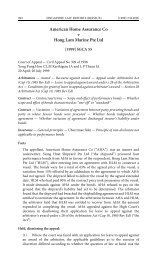
![[1996] 2 SLR(R) 292 - Lim Eng Hock Peter v ... - Singapore Law](https://img.yumpu.com/47482222/1/164x260/1996-2-slrr-292-lim-eng-hock-peter-v-singapore-law.jpg?quality=85)
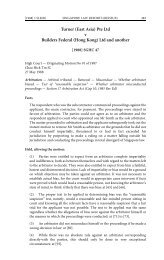
![[2006] 1 SLR(R) 197 - PT Asuransi Jasa Indonesia - Singapore Law](https://img.yumpu.com/46425352/1/164x260/2006-1-slrr-197-pt-asuransi-jasa-indonesia-singapore-law.jpg?quality=85)
![[1985-1986] SLR(R) 503 - Woh Hup (Pte) - Singapore Law](https://img.yumpu.com/45676364/1/164x260/1985-1986-slrr-503-woh-hup-pte-singapore-law.jpg?quality=85)
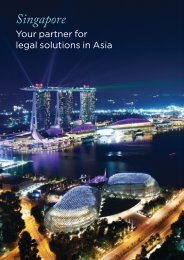
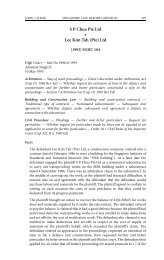
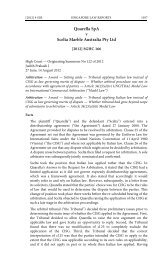
![[2010] 2 SLR 821 - Singapore Law](https://img.yumpu.com/43145563/1/166x260/2010-2-slr-821-singapore-law.jpg?quality=85)
![[2007] 1 SLR(R) 597 - PT Asuransi Jasa Indonesia - Singapore Law](https://img.yumpu.com/42983489/1/164x260/2007-1-slrr-597-pt-asuransi-jasa-indonesia-singapore-law.jpg?quality=85)
![[1989] 1 SLR(R) 433 - Singapore Law](https://img.yumpu.com/42649524/1/164x260/1989-1-slrr-433-singapore-law.jpg?quality=85)
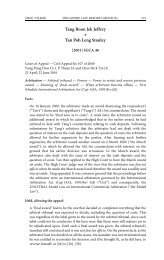
![[1997] 3 SLR(R) 360 - Singapore Law](https://img.yumpu.com/42287507/1/164x260/1997-3-slrr-360-singapore-law.jpg?quality=85)